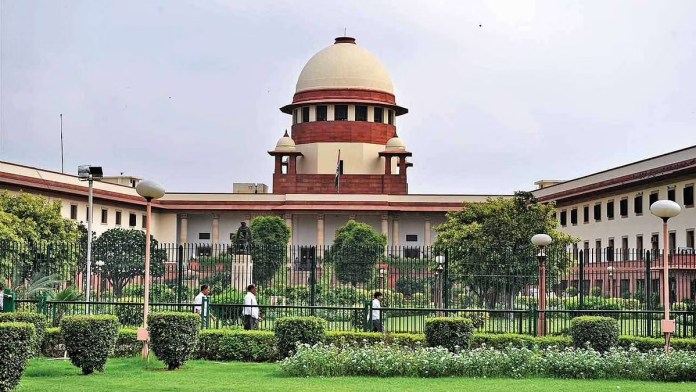The collegium system of selection of judges for the higher judiciary, which many experts see as a mechanism to maintain the judiciary’s hegemony, has apparently turned into a bone of contention for the Narendra Modi government that, while not bringing another bill to have a say of others in the selection, is going slow on it. “It appears the government is unhappy over NJAC Act not passing muster,” the Supreme Court today said on the delay in the union government’s expected acceptance of the recommendations of the collegium.
The apex court expressed anguish over the Narendra Modi-led government’s procrastination in approving names recommended by the collegium for appointment as judges in the higher judiciary.
Supreme Court frustrated?
The Supreme Court bench said it “effectively frustrates” the method of appointment. The court asked if the National Judicial Appointments Commission (NJAC) not passing muster was the reason that the government was not happy, and is hence not clearing names. “Once the collegium reiterates a name, it is (the) end of the chapter,” it insisted. The highest court of the country said there could not be a situation where recommendations were being made and the government kept sitting on them, which frustrated the system.
A bench of Justices SK Kaul and AS Oka said a three-judge bench of the apex court had laid down the timelines for the appointment process to be completed. Those deadlines have to be adhered to, it said.
Justice Kaul said that it appeared that the government is unhappy with the fact that the NJAC Act did not pass muster, but that could not be a reason not to comply with the law of the land.
The bench of justices said that the union government could not hold back on clearing names without mentioning a reason for the reservation. The court also warned of judicial decision, saying, “For the last two months, the whole thing has come to a standstill,” adding, “Please resolve it.”
“Don’t make us take a decision on this in (sic) the judicial side,” the bench said.
“The ground reality is, names are not being cleared. How will the system work? Some names are pending for the last one and half years,” the Supreme Court remarked. “It cannot be that you can withhold names, it frustrates the whole system…And sometimes when you appoint, you pick up some names from the list and (do) not clear others. What you do is you (sic) effectively disrupt the seniority,” the court added.
The apex court had, in its 2015 verdict, struck down the NJAC Act and the Constitution (99th Amendment) Act, 2014, leading to the revival of the collegium system of existing judges appointing judges to constitutional courts.
“How does the system work?” the bench said, “Our anguish we have already expressed.”
“It appears to me, I would say, unhappiness of the government of the fact that NJAC does not pass the muster,” Justice Kaul said.
The apex court, which posted the matter for hearing on 8 December, said it expects both the Attorney General and Solicitor General to play a role in advising the government so that the law of the land is followed. “Till the law stands, it has to be followed,” it added.
Criticism of the collegium system
Union Law Minister Kiren Rijiju said on 25 November that the current mechanism to appoint Supreme Court and high court judges was “alien” to the constitution. The Supreme Court in its wisdom, through a court ruling, created the collegium, he said, noting that before 1991 all judges were appointed by the government.
During the proceedings of the case, Solicitor-General Tushar Mehta told the court: “Independence of the executive is as sacrosanct as the independence of the judiciary, the government retorted while referring to the perceived opaque collegium system for judicial appointments.”
The collegium system for appointment of judges to the higher judiciary can be improved and criticising it without coming up with an alternative “does not lead us anywhere,” former Chief Justice of India TS Thakur conceded on 13 November.
Among the neutral observers who have publicly deplored the selection of judges by judges themselves is Dr Nagabhairava Jaya Prakash Narayana, founder of the Loksatta NGO and founding president of the party, general secretary of the Foundation for Democratic Reforms and eminent thinker. He had said in an interview with Surajit Dasgupta, who is now the editor of Sirf News, right after the Supreme Court dismissed the law made by the parliament: “… the fact is that the Supreme Court judges are interested parties in the appointment process and, therefore, tremendous judicial restraint is called for. I’m afraid that restraint that was so necessary in a mature institution seems to not have been exercised.”
A website for training IAS aspirants calls the collegium system “unconstitutional and autocratic” and “undemocratic”, which smacks of “non-transparency”. It says the system “promotes nepotism”, is “inefficient” and “ignores SC’s own guidelines… against established conventions”.




You must log in to post a comment.